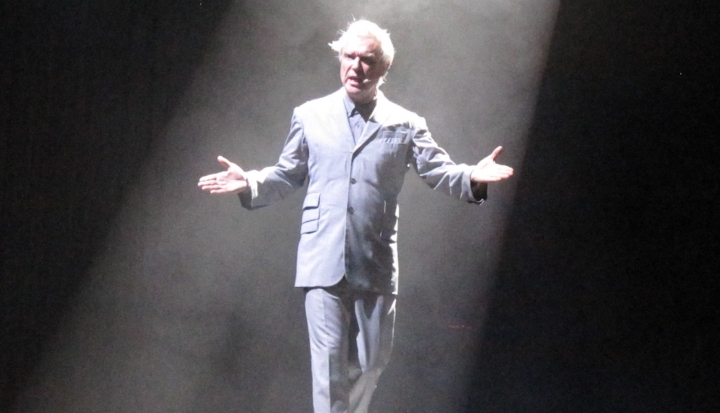We face no shortage of celebrities who have responded to our troubled world with anger, with protest, or by joining the Resistance. Those who have responded with an artistic affirmation of hope are somewhat scarcer. Then again, David Byrne has never marched to the same beat as anyone else.
Probably Byrne is known best as the former front man for Talking Heads. In truth, he is a fascinating artist whose vision encompasses much beyond pop music. Before Byrne released his newest album, American Utopia, in March 2018, he had already launched a project he calls “Reasons To Be Cheerful” in a public lecture at the New School in New York.
Byrne’s work is filled with wonder at being human, even if that wonder is sometimes expressed in strange ways. His music goes to dark and weird places, because he searches everywhere. Yet what he shows us almost always somehow expresses joy and hope.
From the landmark concert movie Stop Making Sense down to his more recent Broadway show, Byrne experiments with the relationship between performer and audience. Every inch of his lanky frame an artist, Byrne has been saying something for a long time. With the staging of American Utopia, which goes until February 16, much of what Byrne has been saying comes into a clear, timely focus.
I suppose I should acknowledge that the album American Utopia contains the lyric, “The pope don’t mean s—t to a dog,” and for many other reasons David Byrne is a strange subject for a Catholic publication. The son of an engineer, Byrne’s understanding is shaped by the scientific and the mechanical. There is little place for piety in his work, and his outlook might be described most nearly as secular humanism.
All of this makes it even more remarkable that the message of his Broadway show is the very Catholic idea that the world depends on our individual, inner transformation of mind and heart, which we cannot accomplish alone. Our true selves are linked to one another through relationships.
In this troubled world, David Byrne offers us a glimpse of hope indistinguishable from the Catholic synthesis of the human person and the common good. Catholics should take note. We might learn something from David Byrne who, lately, is spreading our message more credibly than we are.
Byrne pays close attention to how his show manifests the sense of community he sings about. His stage is uncluttered by equipment, and so it becomes a space shared with the audience. The musicians carry their instruments or wear them, so they can go anywhere in the theater. Their microphones and amplifiers are wireless, and they wear sensors that bring the stage lights wherever they go. The costumes are uniform: gray suits with gray shirts and bare feet. Yet the performers bring diverse faces and shapes. They are women and men, black, brown, and white. They are America and, in the space Byrne has created, we are performers, too.
Maybe what is most striking about American Utopia is how well Byrne manages to describe our situation today, and how unsparingly he does it. This is impressive for two reasons.
First, Byrne has not written new material for Broadway. He does cover Janelle Monae’s “Hell You Talmbout” to name victims of racism. But otherwise, he has mined his own four-decade songwriting career to construct a narrative about this American moment.
“I Should Watch TV,” from his 2012 collaboration with St. Vincent, evokes the overpopulated but still-desolate media landscape that might inform us or be good for us but, instead, transforms us into rival teams. “Slippery People,” from 1983’s Speaking in Tongues album 31 years earlier, hints at the violence that is possible when religious faith is manipulated by people with unsavory agendas.
But there is a second, far more remarkable thing at work in American Utopia. Byrne believes avidly that we can find our way forward together. “I can see those tears, every one is true,” begins the last song of the show, “One Fine Day.” Our crisis is real and there is no room for false hope. Yet, “Even though a man is made of clay, everything can change.” Most tellingly, he quotes John Winthrop’s 1630 sermon: America is—we are—“a city on a hill.” Or, we can be. But we have to try harder. The work is hard, but it is not for nothing.
In troubled times before, the church and the world have found refuge in utopian writing. The word utopia was coined by St. Thomas More, who responded to the plague of corruption with his Utopia, which means “no place,” even as it is a pun on eutopia, which means “good place.”
Utopias do not exist. Yet hope abounds. Much as in Christian life, we are on a pilgrimage toward a eutopia that we believe exists. But it is not here, we cannot see it, it is a utopia—no place—if we try to find it on a map. We are the ones who work and live that good place into existence.
Byrne quotes James Baldwin as he introduces the last song of the show: “We can do with this country something that has not been done before.” Even suffering discrimination and exclusion himself, Baldwin agreed with Winthrop. So we have no right to abandon hope. Our journey is not over.
Especially on a “Road to Nowhere,” “It’s not that far, that one fine day.”
Image: Flickr cc via Dirk Haun
















Add comment